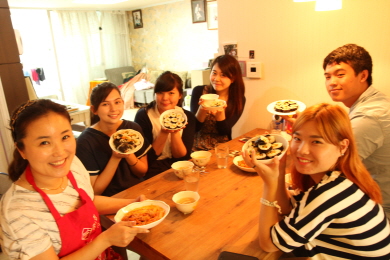
It is not difficult to find restaurants where foreigners can taste Korean food and experience Korean culture. However, there are people who are not satisfied with the way in which the current tourist industry delivers the image of Korea through its manufactured programs of food tasting and museum visits. To come up with a unique travel service that provides tourists with authentic experiences, this group of nine youths from Korea, China, Taiwan and Japan founded “Anispoon” in 2014 and are holding numerous meetings every week.
Anispoon is a service that connects foreign visitors with its host. Each host has a special program comprised of a traditional Korean meal and a local cultural activity. What is special about this service is that it enables foreign visitors to peek into the real life of the native host and actually take part in it. Even though it is a charged service, after eating a home-made traditional Korean dish samgyetang, ginseng chicken soup, making a lotus lamp and playing the traditional Korean game yunnori together, the visitors feel as if they are invited to the host’s home.
The hosts are chosen through a rather strict selection process. First, the company receives applications which include information such as where they live, which language they can speak and the characteristic of their home-made food. Applicants who passed the application review should also undergo an interview with the Anispoon members.
“We interview people to see if they are suitable to be our hosts. The taste of food is not the most important point,” said Kwak Jae-hee, one of the founders of Anispoon. “We regard food as a mere tool of communication. What we are actually looking for is a good-natured person with the ability to communicate and get along with the foreign visitors. Eating meals together is a means of sharing.”
Kwak and other members of Anispoon think that their unique service of offering intimate house invitations makes the foreigners’ trip to Korea more memorable.
“I am glad I experienced Anispoon’s home-cooked meal,” said Lisa Lu, a customer from Hong Kong. “Don’t let the thought of walking into a stranger’s home put you off. The hosts are very welcoming and friendly. Not only did I enjoy the great home-cooked meals, but I also enjoyed the fellowship and friendship built from the meal sharing experience. The Hanbok experience was unforgettable too.”
Anispoon members feel rewarded when they recruit a new host and have more customers. It reminds them that the service they came up with is a necessary service to both the host and the customers. To provide the opportunity of making unforgettable memories to more people, Anispoon recently started their service in Taiwan.
“We believe that by eating meals together, people become a family,” Kwak said. “The aim of Anispoon is to be a cultural company that connects people all over the world as a family.”
Yang Hae-in
allesy94@ewhain.net

